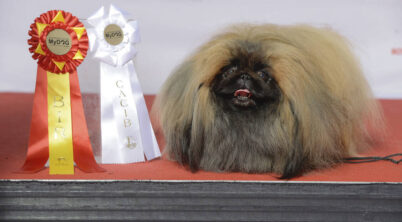Pekingese dogs are cherished for their loyal and affectionate nature, but like all breeds, they face certain health challenges as they age. One such challenge is cognitive dysfunction, commonly known as doggy dementia. This condition manifests in symptoms that parallel those of human Alzheimer’s disease, such as disorientation, changes in behavior, and altered sleeping patterns. Pekingese may become more agitated and restless at night, and during the day they might exhibit an increased need for sleep.
These dogs are susceptible to cognitive dysfunction due to their age, with symptoms including confusion, diminished ability to recognize familiar faces or environments, and potential increases in aggression. It’s crucial for owners to recognize these changes, as they can signify the onset of dementia. As the condition progresses, affected dogs may exhibit more pronounced disorientation and behavior changes, which can deeply affect their quality of life.
Effective management and treatment of canine cognitive dysfunction require a combination of approaches, tailored to the individual dog’s needs. Providing them with a stable and nurturing environment, along with any necessary medical interventions, can help manage the symptoms. Owners may find that dietary adjustments and specific therapies can also contribute to the wellbeing of their Pekingese as they navigate the complexities of cognitive decline.
Table of Contents
Understanding Pekingese Dementia
While dementia is commonly associated with aging in humans, canines, including the Pekingese breed, can also suffer from cognitive decline. This section explores the complexities of dementia in Pekingese through the lens of Cognitive Dysfunction Syndrome, its signs and symptoms, and the pathway to early detection and diagnosis.
Cognitive Dysfunction Syndrome
Cognitive Dysfunction Syndrome (CDS) in Pekingese involves the degeneration of the brain’s neurons, leading to a decline in cognitive function. Over time, the buildup of abnormal protein deposits, such as amyloid plaques, may contribute to this deterioration. Regular veterinary check-ups can help identify the early onset of CDS.
Signs and Symptoms of Dementia
Pekingese dogs with dementia may exhibit:
- Disorientation: Struggling to navigate familiar environments.
- Memory Loss: Forgetting previously learned commands or house training.
- Changes in Social Interactions: Increased irritability or a lack of interest in socializing.
- Sleep-Wake Cycle Changes: Restlessness or altered sleep patterns.
- Decreased Activity: Less enthusiasm for play or exercise.
These symptoms are often progressive and can worsen over time if left unaddressed.
Early Detection and Diagnosis
The role of a vet is crucial in the early detection and diagnosis of dementia in Pekingese. Owners should schedule veterinary check-ups if they notice changes in their pet’s behavior or cognitive abilities. A thorough assessment may include:
- Behavioral history analysis
- Neurological exams
- Blood tests
- Brain imaging
Early diagnosis can lead to more effective management of the condition and a better quality of life for the affected dog.
Pekingese Health and Care
The health and longevity of Pekingese dogs hinge on appropriate care, with a focus on their diet, exercise, and understanding common health concerns.
Diet and Nutrition
A balanced diet is crucial for Pekingese dogs to maintain their health. They require a combination of proteins, carbohydrates, fats, vitamins, and minerals. Given their propensity for obesity, it is essential to monitor their calorie intake and avoid overfeeding. High-quality food that meets the dog’s life stage (puppy, adult, senior) and activity level will help ensure their nutritional needs are met without causing unwanted weight gain.
Exercise and Activity Requirements
Pekingese require regular but moderate exercise to maintain a healthy weight and prevent obesity, which can exacerbate issues such as arthritis and other joint problems. A daily walk and play sessions can fulfill their activity needs. However, due to their flat faces, they are prone to breathing problems; hence, it’s important to avoid strenuous activities, especially in hot or humid weather.
Common Health Challenges
Pekingese can face several health challenges throughout their lives. Key health concerns include:
- Obesity: Close monitoring of their diet and ensuring regular exercise can prevent this pervasive issue.
- Arthritis: Often develops with age or due to excess weight, making weight management and gentle exercise vital for joint health.
- Respiratory Issues: Their brachycephalic nature makes them prone to breathing difficulties; keeping them cool and stress-free is beneficial.
- Health Problems Related to the Eyes: Due to their prominent eyes, they are at risk for issues like ulcers and infections, requiring regular monitoring.
Careful attention to these areas of health and care can greatly influence the quality of a Pekingese’s life.
Treating and Managing Pekingese Dementia
When a Pekingese is diagnosed with dementia, treatment and management focus on slowing the progression of the disease, enhancing quality of life, and providing comfort. A combination of medication, supportive care, and environmental modifications plays a pivotal role.
Medication and Supplements
Medication: Veterinarians may prescribe medicines that support cognitive function and manage dementia-related behaviors. These can include:
- Selegiline: Helps reduce symptoms of canine cognitive dysfunction.
- Anxiolytics: Used sparingly to reduce anxiety in distressed dogs.
Supplements:
- Vitamin E: Acts as an antioxidant and is believed to support brain health.
- Omega-3 Fatty Acids: Might improve cognitive function.
It is crucial to consult a vet before administering any medication or supplements.
Supportive Care
Providing compassionate and affectionate care is essential for a Pekingese with dementia. Supportive care should focus on:
- Affection: An affectionate approach can help comfort a dog dealing with confusion and anxiety.
- Hydration and Nutrition: Ensuring easy access to water and a balanced diet.
Providing a nurturing environment can significantly enhance a dog’s overall quality of life.
Environmental Modifications
Altering the dog’s environment to make it more dementia-friendly can prevent injury and reduce stress. Here are some suggested modifications:
- Safe Spaces: Create a quiet, comfortable space for the dog to retreat to.
- Routine: Keep a consistent routine to avoid confusing the dog.
- Accessibility: Ensure food, water, and the dog’s bed are easily accessible.
Adapting the home environment helps maintain the dog’s dignity and independence.
Pekingese Breed Characteristics and Genetics
The Pekingese dog exhibits a rich genetic history stemming from Ancient China, characterized by distinctive physical traits and related health issues.
Breed History and Origins
The Pekingese is an ancient breed from China, once revered by Chinese emperors as royal pets. Culturally significant, these dogs have been a part of Chinese history for centuries, embodying a symbolic protection role within the palaces. Their genetics have been preserved largely due to their exclusivity in Ancient China, resulting in a breed with a stable lineage.
Physical Traits and Breed-Specific Issues
Physical Traits: The Pekingese is a compact, brachycephalic breed with a short snout and broad, flat topskull. It’s distinctive for its “lion’s mane” of long hair and large, expressive eyes set on a flat facial plane.
- Snout: Brachycephalic breeds like the Pekingese are prone to breathing difficulties due to their short snouts.
- Eyes: Their large eyes are prone to infections and irritation due to their facial structure.
Breed-Specific Issues: Health concerns in Pekingese are often inherited and can include respiratory problems and eye conditions.
- Respiratory: Their compact respiratory tract predisposes them to various breathing issues.
- Infections: Due to their distinctive facial structure, they are more susceptible to skin fold infections around the nose and eyes.
Understanding these characteristics and potential health problems is crucial for responsible breeding and care of the Pekingese.
Beyond Dementia: Long-Term Health and Well-Being
As Pekingese age, their cognitive function may decline, but their overall well-being hinges on comprehensive health strategies and not just on the management of dementia.
Regular Health Check-Ups
Regular veterinary check-ups are critical for aging Pekingese dogs. These frequent visits allow for early detection of old age symptoms, ensuring that preventive measures can be taken promptly. Comprehensive check-ups should ideally cover:
- Physical Examinations: To assess heart, lung, and joint health.
- Cognitive Evaluations: To gauge cognitive function and spot signs of dementia.
- Blood Tests: To check for underlying health issues common in old age.
Senior Pekingese Care
Senior Pekingese require attentive care tailored to their unique needs to maintain a quality standard of health. Important aspects of their care include:
- Nutrition: A balanced diet rich in nutrients appropriate for their life stage.
- Exercise: Regular, gentle activity to help sustain mobility and mental acuity.
- Comfort: Ensuring they have a comfortable resting environment that accommodates any physical limitations.
End-of-Life Considerations
When a Pekingese reaches the final stages of life, it is essential to consider end-of-life care. This phase involves:
- Palliative Care: Focused on providing relief from the symptoms and stress of illness to enhance quality of life.
- Emotional Support: Both the Pekingese and their caregivers may require support, as this period can be emotionally taxing.
- Decision Making: In some cases, it may include making difficult decisions about euthanasia, always with the compassionate guidance of a veterinarian.








